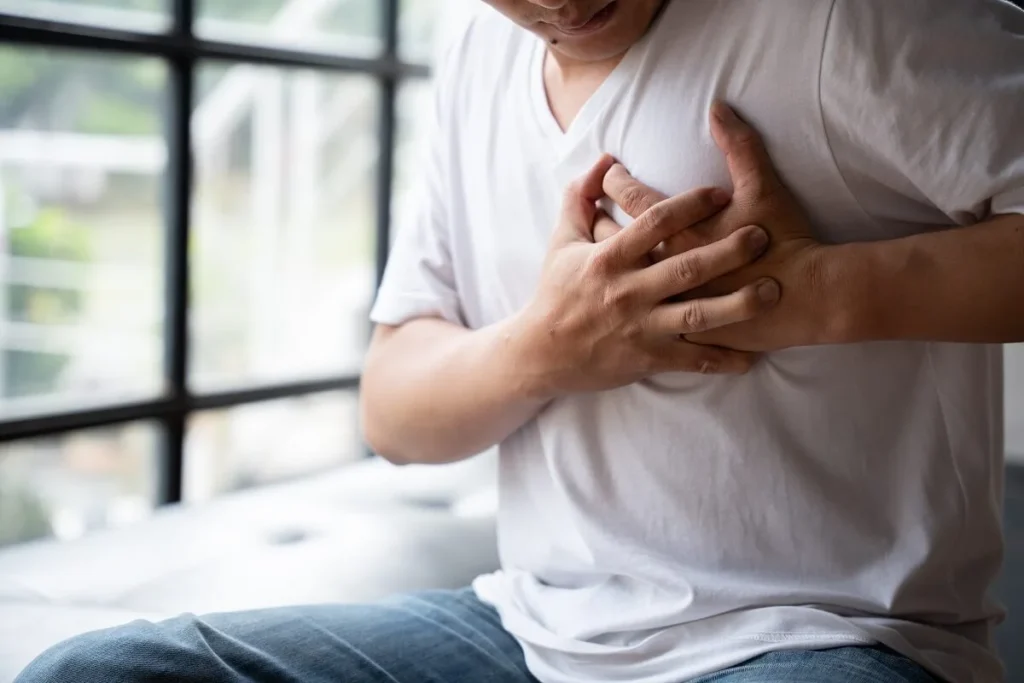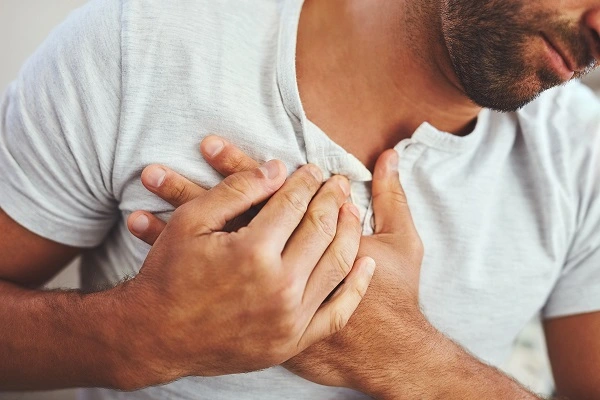Recognizing the early signs of heart disease is vital for early detection and timely intervention. Heart disease encompasses various conditions that impact the heart and blood vessels. This article delves into the general symptoms of heart disease, applicable to both men and women, along with distinct signs that may manifest in each gender.

By understanding these symptoms, individuals can seek medical attention promptly and take proactive measures to promote a healthier heart. Early recognition and intervention play a critical role in managing heart disease and reducing the risk of complications, underscoring the importance of awareness and action in heart health.
Understanding Of Heart Disease?
Heart disease encompasses a range of conditions that affect the heart’s function and blood flow. It can include coronary artery disease, heart failure, arrhythmias, etc. Heart disease often develops due to a combination of factors, including high blood pressure, high cholesterol, smoking, obesity, and a sedentary lifestyle. It’s essential to be aware of the warning signs that may indicate the presence of heart disease.
General Symptoms Of Heart Disease In Both Men & Women
Heart disease is a leading cause of mortality worldwide, affecting both men and women. While some symptoms of heart disease are similar, there are also notable differences between genders. Common symptoms include chest discomfort, shortness of breath, fatigue, and pain or discomfort in the arms, neck, jaw, or back.
1. Chest Pain Or Discomfort
Chest pain or discomfort is a common symptom of heart disease. It may feel like pressure, tightness, or a squeezing sensation in the chest. This discomfort can sometimes radiate to the arms, back, neck, jaw, or stomach.

For Men
Men with heart disease often experience chest pain or discomfort, described as a tight or heavy chest sensation known as angina. This pain can occur during physical exertion or stress and may radiate to the left arm, shoulder, or jaw. Neck or upper back pain might also be present. Men mustn’t ignore chest discomfort and seek immediate medical attention to prevent serious complications associated with heart disease.
For Women
Women with heart disease may have less pronounced chest pain. Instead, they might experience subtle symptoms like unexplained fatigue, shortness of breath during routine tasks, and upper back, neck, or jaw discomfort. Nausea and indigestion are also more common in women with heart issues. Women must be vigilant about these symptoms and seek prompt medical attention for early diagnosis and better heart health.
2. Shortness Of Breath
Feeling breathless or having difficulty breathing, especially during physical activity or at rest, can indicate heart disease. It may occur due to the heart’s reduced ability to pump blood efficiently.

For Men
Shortness of breath is a unique heart disease symptom in men. It can occur during light activity or rest, often accompanied by chest tightness. Seeking prompt medical attention for persistent shortness of breath is crucial for early diagnosis and appropriate care.
For Women
Shortness of breath is a distinctive heart disease symptom in women. It may happen during routine activities or while lying down, along with upper back, jaw, or neck discomfort. Being vigilant and seeking immediate medical evaluation can improve heart health outcomes.
3. Fatigue Or Unexplained Exhaustion
Even after adequate rest, persistent fatigue can be a sign of heart disease. The heart’s decreased blood pump capacity may reduce energy levels and fatigue.

For Men
Fatigue or unexplained exhaustion is a significant heart disease symptom in men. Feeling unusually tired after minimal activity could be a sign of heart issues. Seeking prompt medical attention is crucial for timely diagnosis and better health outcomes.
For Women
Unexplained fatigue is a distinctive heart disease symptom in women. Feeling unusually tired, especially with minimal physical activity, should not be ignored. Seeking immediate medical evaluation can lead to early detection and better management of heart conditions.
4. Dizziness Or Lightheadedness
Feeling dizzy or lightheaded, especially when standing up or during physical exertion, can indicate inadequate blood flow to the brain, which may be related to heart disease.

For Men
Dizziness or lightheadedness is a notable symptom of heart disease. Men experiencing these sensations, especially during physical activity, should seek medical attention promptly for early diagnosis and proper care.
For Women
Dizziness or lightheadedness is a distinct heart disease symptom. Women should not overlook these feelings, particularly during routine activities or position changes, and seek immediate medical evaluation for early detection and better heart health management.
5. Rapid Or Irregular Heartbeat
Heart palpitations, characterized by a rapid or irregular heartbeat, can be a symptom of heart disease. It may feel like your heart is fluttering, pounding, or skipping beats.

For Men
A rapid or irregular heartbeat is a significant symptom of heart disease. Men should not ignore these palpitations, even during rest or light activity. Seeking prompt medical attention is vital for early diagnosis and proper management of heart issues.
For Women
Experiencing a rapid or irregular heartbeat is a notable heart disease symptom in women. Feeling palpitations during routine activities or rest should not be disregarded. Seeking immediate medical evaluation is crucial for early detection and better-managing heart conditions, promoting overall heart health in women.
Unique Symptoms Of Heart Disease In Men
While heart disease can affect both men and women, certain symptoms may present differently in men. It is essential to recognize these unique signs to ensure early diagnosis and prompt medical attention. Here are some unique symptoms of heart disease In men.

1. Chest Discomfort: Men often experience chest pain or discomfort as a primary symptom of heart disease. It may feel like pressure, heaviness, or tightness in the chest.
2. Radiating Pain: Men may also experience radiating pain that spreads from the chest to the neck, arms (especially the left arm), jaw, or back. This pain can be intermittent or persistent.
Unique Symptoms Of Heart Disease In Women
Heart disease can manifest differently in women compared to men, and recognizing these distinct symptoms is crucial for early detection and appropriate care. Here are some unique symptoms of heart disease In women

1. Shortness of Breath: Women may experience shortness of breath, even during mild physical activity or rest. It may feel like you can’t catch your breath or that breathing is laboured.
2. Nausea or Vomiting: Some women with heart disease may experience nausea, vomiting, or an upset stomach. These symptoms are often overlooked or attributed to other causes.
3. Fatigue: Unexplained fatigue, weakness, or feeling extremely tired is a common symptom of heart disease in women. It may occur even with minimal physical exertion.
Key Differences In Symptoms?
While both men and women can experience common heart disease symptoms, such as chest pain and shortness of breath, some variations exist. Men exhibit classic symptoms like chest discomfort and radiating pain, while women may have subtle symptoms like shortness of breath, nausea, and fatigue. It’s important to recognize these differences and seek medical attention accordingly.
Are There Lifestyle Changes I Can Make To Reduce My Heart Disease Risk?
For both men and women, making certain lifestyle changes can help reduce the risk of heart disease.
1. Men: Maintaining a healthy weight, regular exercise, removing stress, quitting smoking, and following a balanced diet low in saturated fats and high in fruits, vegetables, and whole grains.
2. Women: Prioritizing regular exercise, managing stress, quitting smoking, maintaining a healthy weight, and adopting a diet rich in fruits, vegetables, whole grains, and healthy fats.
Conclusion
Recognizing the symptoms of heart disease is vital for timely intervention and improved outcomes. Whether you’re a man or a woman, being aware of chest pain or discomfort, shortness of breath, fatigue, dizziness, or irregular heartbeat can help you take the necessary steps to protect your heart health. If you experience any of these symptoms or suspect heart disease, please consult with a Cardiologist near you.
FAQs: Symptoms Of Heart Disease
Q1: What Are The Risk Factors For Heart Disease?
Ans: Several factors can increase the risk of developing heart disease. Common risk factors include high blood pressure, high cholesterol levels, smoking, obesity, diabetes, family history of heart disease, a sedentary lifestyle, poor diet, excessive alcohol consumption, and age (risk increases with age). Identifying and managing these risk factors is essential to reduce the likelihood of heart disease.
Q2: Can Heart Disease Be Prevented?
Ans: While some risk factors for heart disease, such as age and family history, cannot be changed, adopting a healthy lifestyle can significantly reduce the risk. Regular exercise, maintaining a healthy weight, managing stress, quitting smoking, following a balanced diet, limiting alcohol intake, and controlling conditions like high blood pressure and diabetes can help prevent or delay the onset of heart disease.
Q3: What Should I Do If I Experience Symptoms Of Heart Disease?
Ans: If you experience symptoms of heart disease, it’s crucial to take them seriously and seek medical attention promptly. Contact your healthcare provider or emergency services if you have severe chest pain, shortness of breath, or worsening symptoms. It’s always better to err on the side of caution regarding potential heart-related symptoms.
Q4: How Is Heart Disease Diagnosed?
Ans: The diagnosis of heart disease involves a combination of medical history evaluation, physical examination, and diagnostic tests. Your healthcare provider may conduct an electrocardiogram (ECG/EKG), stress tests, echocardiogram, cardiac catheterization, coronary angiography, or blood tests to assess heart function, identify blockages, or detect specific markers of heart damage or disease.
Q5: Are The Symptoms Of Heart Disease The Same For Everyone?
Ans: No, the symptoms of heart disease can vary from person to person. While chest pain or discomfort, shortness of breath, fatigue, and irregular heartbeat are common symptoms, some individuals, especially women, may experience atypical symptoms such as nausea, vomiting, back or jaw pain, or unexplained fatigue. Knowing common and atypical symptoms is important to ensure timely detection and treatment.
Q6: Can Stress Contribute To Heart Disease Symptoms?
Ans: Chronic stress can contribute to heart disease symptoms and increase the risk of developing heart problems. Prolonged stress can lead to unhealthy coping mechanisms such as overeating, physical inactivity, smoking, or excessive alcohol consumption, which can negatively impact cardiovascular health. Additionally, stress hormones can affect blood pressure, heart rate, and blood vessel function, potentially contributing to heart disease development or exacerbating existing conditions.


